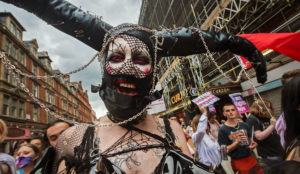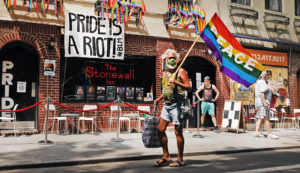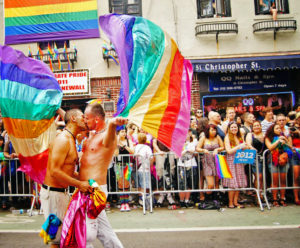Like most origin stories, the Stonewall uprising has been the subject of popular mythmaking. Various branches of the LGBTQ+ rainbow now take credit for the moment, 53 years ago this week, when a group of patrons at a Greenwich Village gay bar rose up in defiance against the police harassment then central to the gay American experience. The most fashionable of these myths, that the main participants at Stonewall were not gay men and lesbians but “trans women of colour”, is promulgated in service of a contemporary political agenda, not the historical record. But the greatest myth of all about Stonewall is that it was where the global movement for gay rights began.
The movement was born years earlier. At 8 p.m. on 1 August 1961, eight years before officers from the New York City Police Department’s Tactical Patrol Force raided the Stonewall Inn, a group of 16 men gathered in Room 120 of the Hay-Adams Hotel across the street from the White House. They were there to hear a presentation about the Mattachine Society, the first sustained organisation in the United States dedicated to improving the status of homosexuals. Founded in Los Angeles in 1950, Mattachine soon started chapters in San Francisco and New York, and its activities were mostly limited to hosting discussion forums and organising support for men victimised by police entrapment. For the first decade of its existence, Mattachine — like the community of people for whom it advocated — existed largely in the shadows.
That posture of passivity would be discarded with the formation of Mattachine’s Washington, D.C. chapter, which was the brainchild of a man named Frank Kameny. A Harvard-trained astronomer, Kameny was working for the US Army Map Service in December 1957 when he was fired for being gay. America was deep into the “Lavender Scare”, a widescale purge of “sexual deviants” from the federal government so thoroughgoing and obsessive that, two months after the Soviets launched Sputnik into space, a military agency tasked with mapping the skies would apply its precious resources towards expelling a highly-trained, competent, and loyal employee.
Distinguishing himself from the thousands of other gay men and women who had found themselves in similar circumstances, Kameny fought back. He asked the American Civil Liberties Union, founded in 1920 “to defend and preserve the individual rights and liberties guaranteed to every person in this country by the Constitution and laws of the United States”, to assist him with a legal challenge. The organisation, which in 1955 had concluded that it was “not within the province of the Union to evaluate the social validity of laws aimed at the suppression or elimination of homosexuals” from government jobs, turned Kameny away: a sign of just how lonely was the plight of the homosexual in post-war America.
The “offence too loathsome to be mention in the Senate or in any group of ladies and gentlemen”, as the majority leader of that august body described homosexuality upon the outing of a colleague in 1942, was illegal in every state, diagnosed as a mental disorder by the medical establishment, and condemned from the pulpit of every American religious denomination. Between 1946 and 1961, when Illinois became the first state to decriminalise homosexuality, an estimated one million people were hit with criminal sanctions for activities ranging from same-sex sexual relations to holding hands in public.
With not even the ACLU prepared to support him, Kameny resolved to fight this gross injustice all by himself. He appealed his firing before the Civil Service Commission — the agency charged with investigating and sacking homosexuals from the federal bureaucracy — and when that failed, petitioned the courts. Lacking any formal legal training, he composed a painstakingly logical and powerfully argued brief outlining why the government’s anti-gay policies traduced the letter and spirit of the Declaration of Independence and the US Constitution: the first time an openly gay person lobbied the nation’s highest court to recognise the rights of gay citizens.
The government’s regulations, policies, practices and procedures, as applied in the instant case to petitioner specifically, and as applied to homosexuals generally are a stench in the nostrils of decent people, an offence against morality, an abandonment of reason, an affront to human dignity, an improper restraint upon proper freedom and liberty, a disgrace to any civilised society, and a violation of all that this nation stands for. These policies, practices, procedures, and regulations have gone too long unquestioned, and too long unexamined by the courts.
The government’s entire set of policies and practices in this field is bankrupt, and needs a searching re-assessment and re-evaluation — a re-assessment and re-evaluation which will never occur until these matters are forced into the light of day by a full court hearing, such as is requested by this petition.
It’s worth noting just how momentous was Kameny’s decision to pursue this course of action. For a gay person to take on the federal government, the medical profession, the media, organised religion — practically the whole of the American establishment — and declare that it was not he that was sick but rather society itself requires a level of moral clarity and personal courage that is extremely rare. The closest analogy I can think of, and a suitable one given Kameny’s vocation as an astronomer, is actually the stuff of myth: Galileo defending his theory of heliocentrism against a flock of ruthless Catholic inquisitors.
The Supreme Court, alas, denied Kameny a hearing, leaving him in dire straits. Since his termination from the Army Map Service, he had been living hand-to-mouth, surviving on meagre unemployment benefits that were due to expire, and handouts from friends. The government’s policy barring those found guilty of “sexual perversion”, enshrined via an executive order signed by President Dwight Eisenhower in 1953, extended to federal contractors, which made this Harvard-educated scientist virtually unemployable at the height of the Space Race. Desperate, Kameny fired off letters to anyone and everyone who might be in a position to help rectify his predicament. “In World War Two, I willingly fought the Germans, with bullets, in order to preserve and secure my rights, freedoms, and liberties, and those of my fellow citizens,” he wrote to the chairman of the Civil Service Commission. “In 1961, it has, ironically, become necessary for me to fight my own government, with words, in order to achieve some of the very same rights, freedoms, and liberties for which I placed my life in jeopardy in 1945. This letter is part of that fight.”
The fight continued with the formation of a Mattachine Society chapter in the nation’s capital. Also attending the meeting that night was an undercover officer from the Metropolitan Police Department’s vice squad, whose chief had received an anonymous tip about the gathering and who had informed the Federal Bureau of Investigation. The FBI enlisted the hotel’s manager to eavesdrop on the proceedings from the hallway. As the volunteer spook related to the bureau the following day, however, the only words he could hear the group of “well dressed” and “very well behaved” men utter over the course of their two-hour-long meeting were “bylaws” and “resolutions”. All the attendees ordered was coffee.
The Mattachine Society of Washington, D.C. was formally chartered later that year, and Kameny became the most prominent “avowed homosexual” in the United States. Under his disciplined and determined leadership, Mattachine lobbied the federal government, organised demonstrations outside the White House, and worked towards building a homosexual group consciousness. Though derided as a dangerous radical, Kameny was the furthest thing from a revolutionary. In the words of Michael G. Long, editor of a collection of Kameny’s letters, Kameny was a “political transformist… dedicated… to transforming social roles, institutions, and practices from being anti-gay into accepting homosexuals as equal in value to heterosexuals”.
The role of Kameny and other gay rights pioneers has been neglected by many historians, journalists, and cultural influencers, who prefer to locate the origins of the movement for gay equality in “a race riot against the police started by hustling transwomen of colour”. They speak of the “privilege” supposedly enjoyed by Kameny and the other gay white men who dominated the pre-Stonewall gay rights movement, as if being a homosexual in mid-century America — hunted by the police, purged by the government, confined to mental institutions, and subjected to barbaric forms of medicalised torture — was a blessed way of life. That the movement’s intellectual roots are reformist and bourgeois does not suit these people’s ideological commitments or theory of history. A group of “well dressed” and “very well behaved” men meeting at a swanky hotel to talk about “bylaws” and “resolutions” smacks of dreaded “respectability politics”.
Kameny himself had little patience for such revolutionary posturing. He had actual work to do. “In my experience, the gay Left peaked and departed a few years after Stonewall, and now plays only a small role,” he wrote in 1990. “However, it continues to exercise a divisive, corrosive and counter-productive effect in New York and, in my opinion, has contributed to making that city’s gay movement one of the weakest in the country.”
In 2011, less than a month after his death, Kameny’s house was entered into the U.S. National Register of Historic Places. This was an appropriate gesture, but falls far short of an honour commensurate with the role he played in American history. A more fitting tribute would be to rename the building that houses the Office of Personnel Management, successor agency to the Civil Service Commission, where in 2009 Kameny was presented with a formal apology from the federal government, after him. But the most meaningful way to recognise Kameny and the positive change he effected would be for Room 120 of the Hay-Adams to earn a place in American history as illustrious as that of the Stonewall Inn.
Disclaimer
Some of the posts we share are controversial and we do not necessarily agree with them in the whole extend. Sometimes we agree with the content or part of it but we do not agree with the narration or language. Nevertheless we find them somehow interesting, valuable and/or informative or we share them, because we strongly believe in freedom of speech, free press and journalism. We strongly encourage you to have a critical approach to all the content, do your own research and analysis to build your own opinion.
We would be glad to have your feedback.
Source: UnHerd Read the original article here: https://unherd.com





